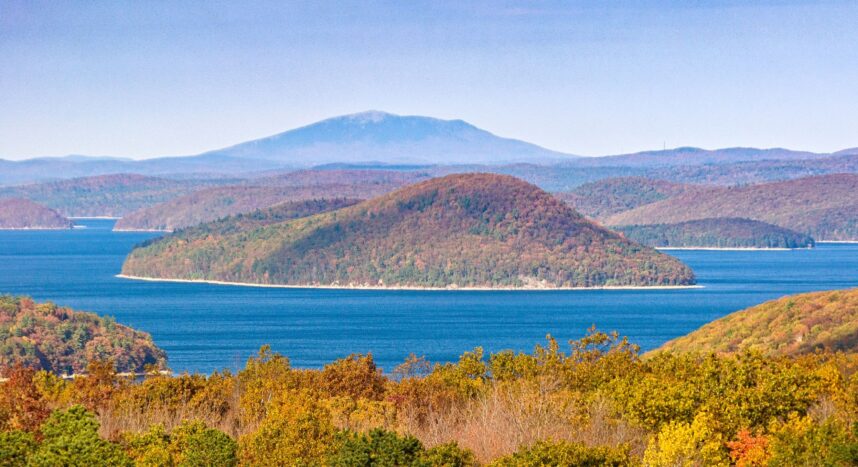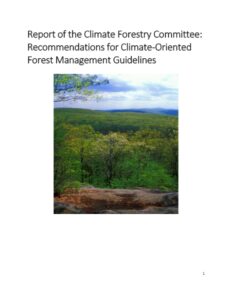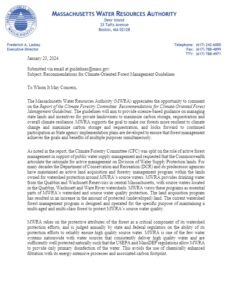On January 24, the Advisory Board submitted recommendations for Climate-Oriented Management Guidelines that were published by the Climate Forestry Committee. Below is the full text of our comments.
The Massachusetts Water Resources Authority (MWRA) Advisory Board appreciates the opportunity to comment on the Report of the Climate Forestry Committee: Recommendations for Climate-Oriented Forest Management Guidelines.
To some, these comments may seem harsh, narrowly focused, and like they are out of step with the overall climate goals of the Commonwealth.
As the voice of the communities and ratepayers, the Advisory Board’s primary goal and role is to ensure that the MWRA has the most pristine sources possible to ensure it can provide the best drinking water in the country to over three million individuals in the Commonwealth each and every day. The MWRA’s member communities – through its ratepayers – have invested millions of dollars over the years and anticipate investing more in the future to continue safeguarding these source waters.
As noted in our initial response for comments during the “Forests as Climate Solutions” process, the Advisory Board supports and applauds the overall goal of optimizing carbon storage and sequestration through sustainable forest management practices as part of the Healey Administration’s initiative. However, we believe this laudable goal must be balanced with the purpose of the previous, ongoing, and future investments that MWRA’s ratepayers have made, are making, and will continue to make in the forests surrounding the reservoirs and watersheds that make up the MWRA’s water supply.
The MWRA Advisory Board would like to highlight that the Climate Forestry Committee (CFC) was split on the role of active forest management in support of public water supply management, with some members advocating for active management to help create a more diverse forest, which can help to improve water quality by serving as a better “forest filter,” others stating that active management wasn’t needed to produce clean water, and still others arguing for no active management at all.
The Advisory Board reiterates its position that carefully considered and deliberately limited active management of the forests around the watersheds provides a better and more cost-effective filter for the waters that make their way into the MWRA’s water supply. As the report notes, the Division of Water Supply Protection (DWSP) acknowledges that active forest management is not “necessary to maintain an abundant and clean water supply”; however, the Advisory Board’s position is the same as DWSP’s that careful cultivation of watershed lands is critical to maintaining a resistant and resilient forest and improves the natural filtration and overall water quality of MWRA’s water supply.
In fact, it is this careful cultivation of the watershed lands, its forests, and its ecosystems that made the avoidance of building a costly water filtration facility possible decades ago, and the ongoing commitment to such a program continues to allow the MWRA to avoid the millions of dollars it would cost to build a filtration facility today. MassDEP has acknowledged over the years that the robust forest management program implemented by the DWSP in coordination with MWRA and its staff continues to be critical to delivery of high-quality water and avoidance of costly infrastructure investments. Moreover, the construction and operation of a filtration facility would likely contribute to an increased production of greenhouse gases, energy consumption, and chemical use, not to mention additional costs for ratepayers.
The CFC has recommended that the Commonwealth more clearly articulate the goals of any active forest management, with specific reference to the DWSP-managed forests. On this point, the Advisory Board agrees, though perhaps with a slightly different perspective than the report’s recommendations might suggest or intend. The Advisory Board would encourage DWSP to further demonstrate its commitment to a carefully considered and deliberately limited program of active forest management by more clearly delineating its overall goals, its plans and procedures for achieving said goals, and – perhaps most importantly – a consistent, frequent, and accurate reporting on the results of its program. As Peter Drucker’s famous adage states: “You can’t manage what you can’t measure.” The Advisory Board calls on DWSP to regularly report to the Water Supply Protection Trust the policies, procedures, and results of its forest management activities as they relate to the objectives of their land management plans and State climate solution goals.
The Advisory Board agrees with the CFC’s finding that forest management is a critical strategy for mitigating climate change and protecting water quality. We also concur with the CFC’s recommendation that the Commonwealth designate at least 10% of its forests as reserves and that these reserves be managed passively to preserve their carbon storage capacity and to protect water quality.
We have, however, clearly laid out our position that forests surrounding water supplies need to be viewed through a different lens, and that a “one size fits all” approach to forestry management cannot work in the Commonwealth given the critical role that the watersheds and the ecosystems and forests within them play in the supply of the pristine source water that over three million consumers have come to rely upon.
We urge the Commonwealth to adopt a more comprehensive approach to forest management that includes both passive and active management strategies. Active forest management is a proven and essential tool for protecting the water quality of the Quabbin and Wachusett watersheds. It ensures the long-term sustainability of vital natural resources, safeguards the delivery of healthy, high-quality water to current and future citizens of the Commonwealth, and delivers carbon sequestration.
We have appreciated the opportunity to participate in the ongoing process of the “Forests as Climate Solutions Initiative” and look forward to continued participation as the State begins to finalize and implement its goals and regulations to achieve them moving forward.
⬇️Click image to read the full Climate Forestry Committee’s report ⬇️
⬇️Click image to read the MWRA’s comments ⬇️



